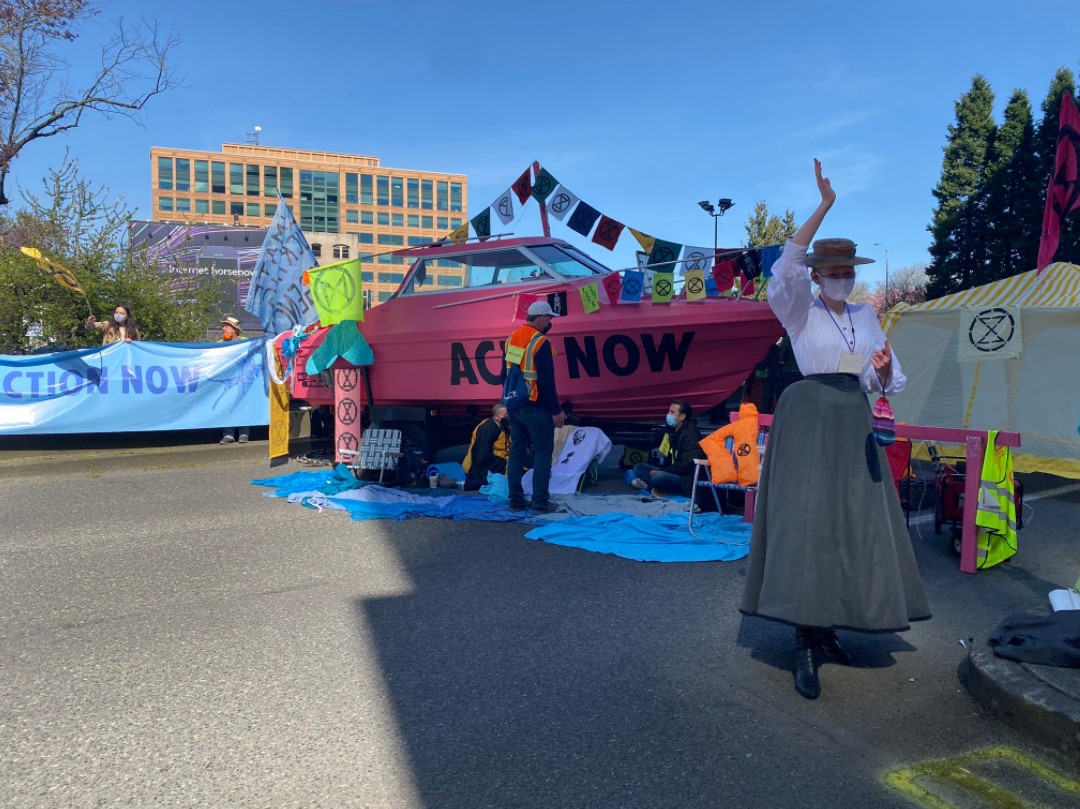
Members of the group Extinction Rebellion stage a climate protest in Portland on Saturday, March 27, 2021. The group said Portland is lagging behind on its goals to reduce carbon emissions.
Sergio Olmos
Climate activists staged a protest on Saturday in downtown Portland, demanding that the city accelerate its efforts to reach net-zero carbon emissions.
The group Extinction Rebellion put the protest together and set up barricades along an off-ramp from the Morrison Bridge. Some activists chained themselves to a bright pink boat parked across lanes of traffic.
“We are demanding that Portland put its money where its mouth is and reach net-zero greenhouse gas emissions by 2025 (as opposed to 2050) as well as convene a citizen’s assembly on climate and ecological justice,” the Portland chapter of Extinction Rebellion wrote in an email.
Portland adopted its current climate action plan in 2015. The goals stated in that plan aim to reduce the city’s carbon emissions to 80% less than 1990 levels by the year 2050. The city climate plan targets a number of areas to reach that goal, such as improving building and transportation emissions, as well as managing urban forests and reducing food waste.
The activists say they want the city of Portland to take its declaration of a climate emergency, adopted last year, seriously.
— Sergio Olmos (@MrOlmos) March 27, 2021
They also want Portland to move up its timetable to be carbon neutral by 2050 to 2025 pic.twitter.com/ImmfyG5TGO
During the city’s most recent update on the plan last year, Portland reported a 19% decrease below 1990 levels. City officials who compiled the report note that the decline occurred even as the population grew dramatically in recent years.
“The reductions to date are especially impressive given the growth of 39% more people and 36% more jobs during the same time period, meaning per capita emissions in Multnomah County have been reduced by 42% since 1990,” the report states.
Still, city officials noted that reductions in emissions had begun to plateau in the most recent data available.
“To achieve the goal of a 50% reduction in carbon emissions by 2030 as identified by climate science, local emissions must be reduced by an additional 31% in the next 10 years,” the report states. “This is a daunting task.”
Last year, city councilors approved a resolution declaring a climate emergency. Still, activists said the city needs to take that emergency seriously by speeding up its work on emissions reduction and by putting together a “citizen’s assembly on climate and ecological justice.”
Portland police contacted the activists just after 2:30 on Saturday afternoon. The activists said they planned to stay locked to the boat for 48 hours or until police removed them.
“Our plan is not to leave until we get our demands met, but obviously there are often practical considerations,” activist Doymo Burke said. “The main point is, what else are we going to do? Business as usual isn’t working.”
The protest did not last as long as the activists intended, however. Extinction Rebellion issued a press release early Sunday morning, stating that “protesters had it on good authority” other groups planned to use the event as a reason to carry out violence. The group did not specify what type of violence, but some protests in recent months in Portland have resulted in broken windows, small fires and graffiti.
“(Extinction Rebellion) is an entirely nonviolent organization, therefore the painful decision was made to call off the action early in an attempt to avoid any violence,” the group wrote in its statement.


